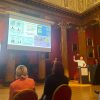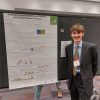Research in the TuttleLab is focused on the concept of reducing molecular search spaces. The reduction of molecular search spaces involves the use of computational methodology to inform, focus and drive the direction of molecular research. The group works in close collaboration with experimental colleagues to ensure the results from our design work are able to be directly implemented in a practical laboratory. The process of reducing molecular search spaces involves three phases: (1) rationalising and understanding existing systems; (2) isolating the governing molecular processes; and (3) predicting new systems with enhanced/desirable properties and reactivities. A variety of different methods are used in pursuit of this goal, including ab initio, DFT, semi-empirical, MM, coarse grain and hybrid QM/MM methodologies.
News From the Lab

Krystian Passes Viva!
Congratulations to krystian who successfully defended his thesis, titled “Elucidation of complex reaction mechanisms through the application of Density Functional Theory”. Krystian was examined by Dr. David Nelson (Strathclyde) and Prof. John Walton (St. Andrews). Krystian’s PhD defence follows a successful collaboration with the Murphy group in which Krystian was a valuable asset in ascertaining […]

Hamish Captivates at the Carnegie Scholars Meeting 2022
Hamish recently presented his work at the 2022 meeting of Carnegie Scholars in Edinburgh last week. His talk, titled ‘Exploring the self-assembly of biomimetic materials for antimicrobial material discovery’, was well received. Joined by fellow Strathclyde Carnegie Scholars, Hamish got to enjoy presentations from other Scholars at varying stages of their postgraduate studies.

The TuttleLab Goes Globe Trotting
Over the last few months members of the TuttleLab have been presenting their work at conferences in Edinburgh, Southampton and Vancouver. Alex and Hamish travelled to Vancouver for WATOC 2022, the World Association of Theoretical and Computational Chemists triennial conference. Over the course of the week long conference both students attended lectures by renowned chemists […]
New members join the group
Two new PhD students and one Postdoc have joined the TuttleLab in 2020, 2021 and 2022. Hamish Swanson, is a Carnegie sponsored PhD student who will be looking at exploring peptoid self-assembly in conjunction with Dr K. H. Aaron Lau. Hamish joined the team in 2020. Ross Urquhart is a phd student who is looking […]








